Martial Canterel, "And I Thought"
Most of the music I listen to these days makes itself appealing to me by virtue of its wordlessness (for a list of my top 10 2014 listens send an SASE to the office, but for sure don’t sleep on Christina Vantzou’s No. 2 or Jo Johnson’s Weaving) yet there are still a couple of songs that somehow slip through and get themselves stuck up inside my sad and deteriorating brain. One of those is Röyksopp’s “Skulls,” but even more is this song here, from Martial Canterel, which is a new act to me, and is also apparently the side project of another band that is also new to me. One of the few nice things about getting old and not caring so much about what’s happening now (because all of it is terrible and worthless anyway) is that so many things do in fact become new to you. I think right before you die you realize it’s all new, but that is just a guess on my part; check back with me right before I die (if the forecasts are correct, this winter will probably do it) and I will let you know. Anyway, this song, it’s good, check it out.
Interstellar Is a Black Hole From Which No Wonder Escapes
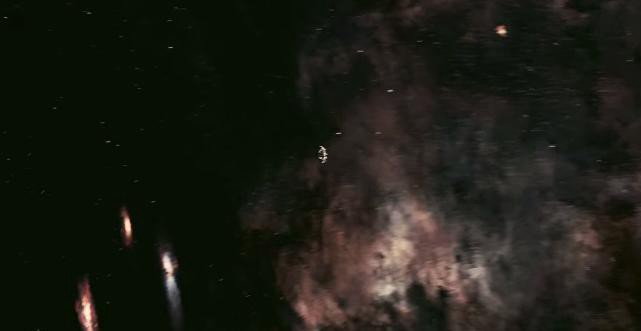
Insterstellar holds together reasonably well as a film about people. A father is called to leave his daughter, and then tries to fight his way back to her; he is driven to travel to the edges of known space, and through time — through time — by his desire to save her or find her or both.
The setpieces are spectacular but the story never lingers on them for more than a few moments. Each ship or planet or weird space-time topology is just obstacle to be dealt with and forgotten about. This isn’t always obvious as you’re watching the film, just how small its story is, because everything on the screen in front of you is so loud and huge. The roaring and blasting and infinite vistas have the helpful effect of making all the foreshadowing and exposition, which would come across as dumb and blunt in a smaller/quieter/slower film, mostly tolerable. (Do not wait to watch this movie on the back of an airplane seat! Also if you haven’t seen it yet I guess stop reading, spoiler alert, etc. Try to find an IMAX screen.)
This is a film in which nothing is left to subtext. A character, at one point, says: “Love is the one thing that transcends time and space.” In an interview, Christopher Nolan’s brother, Jonathan Nolan, who helped write the script, said:
The film is about parents and their children. When I started writing it, I didn’t have any kids. Now I have a little girl who is a year old, so watching the film is a completely different emotional experience for me.
This is a film that tells you what it’s about, again and again. And it’s not about space.
This makes for a cohesive story but a strange piece of science fiction. The first third is dedicated to introducing characters, setting a grim mood, and establishing a backdrop of theoretical physics — which is fun, a little like reading or watchign Cosmos for the first time. Characters explain space-time and scribble diagrams and fold papers and convey, generally, the idea that the universe is big and weird and poorly understood, but that we’re finally beginning to understand what we don’t understand, where these gaps are, and what types of things we might find in them.
The middle third — by far the most entertaining — puts the explanatory groundwork of the first to use. It’s like a dozen disconnected chapters from different Arthur C. Clarke books rolled into one hour, with ships skipping off the cusps of black holes, first-contact scenes on weird and inexplicable planets, ambiguously conscious robots, Hard Decisions based on Limited Resources, and variable time scales. For a sci-fi fan this is pure candy — it’s just trope after classic trope rendered, in no particular order and at great expense, by an extremely competent technical filmmaker.
Which is why the third act is so jarring, when the movie suddenly narrows its focus back to its father-daughter story. The problem is that, by then, Nolan has set up actual physical mysteries — crude representations of real questions from the frontiers of physics — as problems that must be dealt with in the service of a human narrative. For Inception, which is structurally similar, this is fine: Nolan introduces a new fictional universe, with its own set of laws, and tells a story within it. In Interstellar, he borrows his universe from popular theoretical physics, and attempts to use its laws as a rigid narrative framework. These “laws,” however, are sparse and confusing weird and contradictory; they point in no particular direction and have no motives or purpose. They’re difficult to conceive of and even more difficult to deploy. They’re ragged and fascinating and vexing and, for Nolan’s tight and twisty storytelling, kind of useless.
It’s an abrupt turn for viewers, who spend most of the film watching characters deal with the reality of a cosmos that is much bigger than they are, and which fundamentally does not care, but who then watch this semi-fictional universe, in all its mysterious vastness, realign around the relationship between a couple humans from Earth. Interstellar suggests a science-fiction god of the gaps: That all these seemingly unknowable features of time and space and the universe are actually just expressions of humanity writ large; that if only we could look inside ourselves, we could fold all those dimensions together into a feeling. Which kind of… sucks? I think so! It’s such a weird, surrendering Ptolemaic turn. Why are we here? For us. Where are we? We are with us! Who are we? We are us.
Nolan has a tendency not to tell stories so much as resolve them. Insterstellar solves its own story, and in the process, solves the entirety of all things. It’s a movie about exploration and uncertainty and space and great distances with a suspiciously deficient sense of wonder; it’s exhilarating and full of ideas, but it doesn’t let those ideas bounce around in your head for very long. Nolan demanded that his fictional universe be both familiar and realistic and yet complete, and in the process made infinity feel claustrophobic.
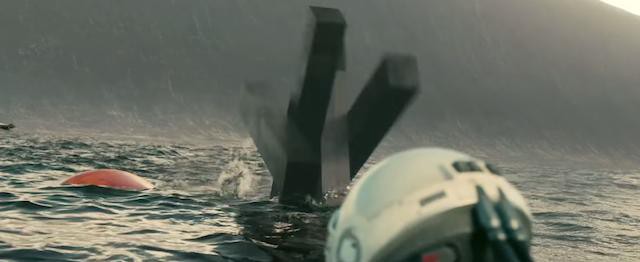
Anyway, half-related: If Interstellar does well, and suddenly there’s more money for big huge space stories, here’s a show I would like to see. The world is ending, something about plants and blight and dust and fire. A bunch of ships set out to find new worlds, I guess there’s a wormhole, who cares — basically, the first hour of Interstellar could be the pilot. Then just explore. Spend some time on the water planet, on the ice planet, on the desert planet, on the rock planet, on the storm planet, on the slick boring sphere planet. (No aliens! Thanks.) Give the characters some time to live in these enormous setpieces. A first contact every episode, or even every season. Bring lots of robots (Interstellar’s TARS and CASE are excellent). Let the stories unfold there, with the mysteries of the universe as a backdrop. Let the people be people and let the cold uncaring infinity remain their eternal enemy. I would watch that!
A Poem by Corey Van Landingham
by Mark Bibbins, Editor
Love: An Origin
did X split the neck of an egret bathe
in its blood and wish for something
that would change her life did X know
it would be love would she have wanted
something so pain-yoked deep-throated
something so hungry did X know right away
the diagnosis or was it a slow unfurling
fueled by the slipping away of light
into evenings to be unseen and thus
adored did she imagine something
different was it less about winning and
being won did she offer a man
the opaque flesh of a fish with her fingers
when he refused her is that when she first
split open did love begin with negation
was it the not-having that turned X into
a fiend did it happen like the first time
she saw a sunset and thought the sky
was bleeding until she had words to prove
it wasn’t wasn’t it bleeding did X
have the word for love before the man
did she carve it into her thigh and later
did she regret it when the men would
tell her what they would do to her when
they got her into their beds did she ever
wonder why when they flashed their
tongues it was always when and never if
Corey Van Landingham is a Wallace C. Stegner Poetry Fellow at Stanford University, and the author of Antidote (Ohio State University Press). Her poems have appeared or are forthcoming in AGNI, The Best American Poetry 2014, Kenyon Review, Ninth Letter, The Southern Review, and elsewhere.
You will find more poems here. You may contact the editor at poems@theawl.com.
Rock Technically Not Dead
“Drummer Phil Rudd of Australian rock band AC/DC whose hits include “Dirty Deeds Done Dirt Cheap” was accused Thursday of trying to arrange two killings as well as possession of drugs….AC/DC is due to release the “Rock or Bust” album next month and plans a world tour next year. It was unclear whether Thursday’s events would affect those plans.”
New York City, November 4, 2014

★★★★★ The morning clouds were soft blurs, and lower in the sky was an eggplant-colored haze. The jacket, shed while hurrying off to the preschool teachers’ conference, stayed off afterward. Outside the polling place, each blade of grass stood erect and aglow. The warmth was not feverish but soft and springlike. A child crawled around on the sidewalk, circling its stroller, beside Broadway. The clouds’ shapes firmed up; they were high but not too high, so that the eye followed their curves beyond the rooftops, the sky insisting on its expansiveness. A smoky gray spread in the west late, with a rosy glow below it and a band of hot orange below that. White points of light shone in the Freedom Tower, and yellow ones in an unglassed building under construction to its right. In the east, in the night, a fuzzy halo surrounded the waxing moon. A man pissed in the shadow of a building face with a Niagara gushing roar. The moon looked small, framed in the cross street, like the disappointing moon in photographs. The clouds over it slipped aside.
Under Michel Faber's Skin
by Hope Whitmore
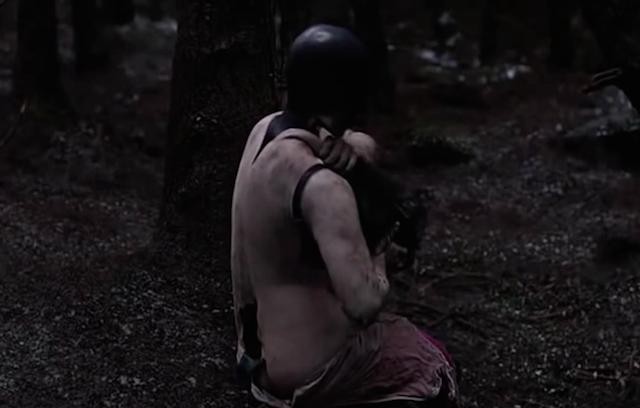
Michel Faber is currently on tour to talk about his new book, The Book of Strange New Things, an apocalyptic novel of love, loss, and the end of the world. As he was writing it, his wife Eva, who died this past July, was diagnosed with terminal cancer. His grief remains clear, but so is his kindness — which comes across both in his novels and in his desire to put my friend Jonathan, who’d tagged along, and I at ease. We talked for a while about life, death, and Jonathan Glazer’s recent adaption of his novel Under the Skin into a tight, strange little film, among other things, like Gone Girl.
There’s something apocalyptic in your writing — the old guy at the bottom of the stairs in Crimson Petal and the apocalyptic stuff in The Book of Strange New Things.
You seem nervous. Are you all right? Don’t worry, I’m all right.
Thank you. So, the apocalyptic zeitgeist, is that something you’re kind of picking up on?
I’m not a soothsayer or a prophet. I have no idea what lies in the future, so I don’t know how concerned or otherwise we should be about global warming — I mean, obviously we should be concerned, but I don’t know how much is truly caused by humans; I’m not a scientist. So the apocalyptic elements in The Book of Strange New Things, they’re not so much because I’m interested in end times, but because I see them as almost symbolic of a wake-up call to individuals. The book’s purpose — if it could be reduced to just one purpose — is to make us cherish life more, the life that we’re given, these extraordinary bodies that we inhabit, and this amazing planet that we’ve been given to live on.
Does it fit in with your own religious beliefs? Like are you a religious believer or a humanist? What would you say you like identify with?
At this point, I would have to say I’m an atheist. I’ve made changes as the years have gone by. As Shakespeare says, that there are more things on heaven and earth than are dreamt of in our philosophy, but I’m not able to have faith in any kind of deity or guiding spirit. I’m interested in writing about people who do have that faith and I want to write about them sympathetically or empathetically, without mocking or denigrating them.
I had a religious upbringing — I was a Baptist when I was a kid — and my wife was a Jehovah’s Witness, so we both had that religious grounding, but we both left our faith and lived our adult lives as atheists. My wife, in particular, lived what I’d say was a wonderfully Christian life. She was one of the most inspiring Christians I ever knew, even though she stopped believed in Christianity any more.
She sounds like a lovely person.
She was, I was very privileged to be her partner for twenty-six years.
I’m sorry that she died. I’m really sorry.
Yeah, she had a very horrible and humiliating death, from incurable cancer. But I hope that she lives on in my behavior. At this point of my life, I don’t believe that she lives on in any specific spiritual form, and I don’t think her spirit is here with us in this room right now; she’s a canister of ash. But she had an enormous influence on me and she treated people very kindly and I really want to make sure that in the rest of my life I behave in a way that she would have liked to think that I could behave. Have you lost anyone whose very dear to you?
Erm, yeah, my brother died of a brain tumor when I was still quite young. He was older than me. I was nineteen — no, I’d just turned twenty. Cancer of the central nervous system. But he had it for like, twelve years and survived.
Jonathan: Yeah there was Lindsay, a friend who died in a car accident, I was nineteen.
This Lindsay who died in a car accident, the kind of grief there, is because when a dear friend of yours dies in a car accident, you remember them exactly as they were. It’s a particular kind of pain because you just cannot believe they’re gone — you spoke to them yesterday. How is it possible? How can they be gone when they were just talking to me yesterday? But you don’t have the pain of seeing someone deteriorate, day after day.
My mother’s friend, her daughter was killed in a car accident. She was talking about it and wondered if it was almost better if she’d had cancer because it was so sudden…
It’s a lose lose situation, and if her daughter had the opportunity to choose, she would have said it was so much better to be killed in a car accident.
It’s just what her mother was saying — she was upset at the time and I don’t think she meant it perhaps. But yes, grief and missing someone and that sense of wanting to reconnect with them, that’s a very big theme in The Book of Strange New Things.
It wasn’t planned that way. When I was hatching the book, I didn’t know that Eva was going to be diagnosed with cancer, but it certainly ending up being suffused with the anticipation of loss. The book’s about many other kinds of loss as well. It’s the book of loss to end all books of loss, but I tried not to make it an incredibly feel-bad book. I tried to make sure that it would be worth the journey and that you wouldn’t feel that you’d just been taken to a dark hole and dumped in it. Anyway, how did you feel about it?
It was very human, I liked the main guy. I thought he was flawed, almost naïve. It wasn’t like an affected naivety, but he made a choice. The idea you can choose that kind of naivety — maybe I’m not using the right word — but that you can choose to run on that trusting nature…
Well, the trust thing is interesting. When I was hitchhiking years and years ago, trying to get back to Scotland and I got stuck in Wales, it was late at night, about quarter to eleven, and I thought I was going to have to sleep under a tree or something. A car pulled up, and it was a woman. She took me into the car, and it was a tiny woman, a little bird-like woman — much more delicate than you are — with tiny wrists. She didn’t know me at all. I’m a six-foot-one guy, and I was totally laden with my anorak or whatever. We talked for about half an hour. I waited until she was relaxed enough in my company for her not to be freaked out by me asking this question, then I said to her: “Look, you don’t know me at all, you chose to pick me up late at night in the middle of nowhere. I’m a big guy and you’re a very small woman. I could have done anything to you, why do you do that?”
She said, “I don’t want to live in a world where I’m scared of people, so I decided that I could trust the world — that I could trust human beings — and that’s the principle on which I’m living my life.” I really, really hope that that hasn’t let her down.
I hope that worked out for her, because I’m not that trusting. I ran away from away from a guy in the street in who asked me directions at three o’ clock in the morning when there was nobody else about. I probably should have stayed and given his directions. Afterward, I thought, “What if he’s still out there and he’s still lost?”
Well, you know, he could be still out there and still lost. Or someone could have taken pity on him and given him directions. Or the next woman he asked for directions, he could have raped. But each of those scenarios — there’s an attitude you bring to it — an anticipatory attitude to that person, and Peter made that decision not to be cynical.
It must be nice, to just take people at face value, like the Oasans in the book. They’re just so simple — not simple, they have this very straightforward attitude. They just say how things are.
At the time I was hatching the book, I was very wearied by all the hidden agendas and neuroses of human beings. I think that one of the reasons I made up the Oasans was that it was like a fantasy of being able to hang out with people who were totally benign and totally un-ego-driven.
It’s good, but it’s kind of — it’s what makes humans what they are.
Of course it is. The Oasans, on another level though they are a bit like sheep, or bees in a hive. Human beings are wonderfully various and distinctive and memorable and a lot of what makes them that way is their dysfunctions and their neuroses; you can’t have one without the other.
I wanted to ask about the theme of alienation, in this, The Crimson Petal, and The White and Under the Skin.
The reader is an alien as well because at the very beginning of the book I warn the reader that you are an alien from another time and place altogether.
Why?
Well, I was a grossly alienated young person. I was had a very weird family upbringing and really didn’t have much in common with my peer group. The only friends I had were other very alienated people.
A lot of people who see themselves as alienated join a club of other people who are alienated in that way. They become punks or whatnot, and they all hang out together and share an anti-other people agenda. I was so alienated that there was no way I could join anything, or consider myself a part of anything. I didn’t get involved in drugs or drinking or things like that, because they seemed like conformist activities — things that other people were trying to be badly behaved in certain predictable ways. So I really was a fringe dweller and I wrote for many, many years — twenty-five years or something — without submitting my stuff. I just wrote it for myself and put it away.
When I got together with Eva, my wife, she was the one who inspired me to share it, to put it out there in the world. As a result of knowing her, I became a lot more connected with other people.
When I started The Crimson Petal and the White I was about eighteen, so I was the age of Sugar, and I carried that anger that she had. I finished it when I was in my thirties, so by that stage, I’d had that maturing as well, so that’s an interesting book, in that it’s got dual elements in it — the character has this emotional journey she has to go on very fast.
I get quite interested in whether someone who’s damaged and alienated and scarred and embittered can get better — whether they can learn how to love other people, learn how to be a human, if you like. It’s easy to write books describing alienation; you can wallow in it, and it ends with some huge alienation tragedy where the person gets killed or kills other people. What I’m interested in is how much room there is for connecting with other human beings, and when I do that in my fiction, it’s not cheesy or sentimental or false. I want the books to be true, deeply and naturally true, and yet to transcend in some way — not the sort of artificial halo transcendence that’s imposed on other writing.
You write also about lost connections. William and Sugar have this almost-connection but they don’t because he just can’t get over his — they almost have a proper relationship that moves past master and prostitute.
Yes, that is deliberate — the almostness of it — and in the first version of the novel that I showed Eva, William was actually more of a shit. Eva said, “You’ve got to make him more…not lovable exactly, but you’ve got to suggest his potential for being compassionate or” — what is the word I’m looking for?
Sympathetic?
She said that if you make him more sympathetic then the reader will imagine that he’s more capable of making that sort of change, and then when he lets her down, it’s worse. It has more impact. It’s like, “We expected more of you; we thought you could do it. You’re almost there and yet you didn’t have what it took to take that extra step.” That was really why it was like that.
It was clear that he wanted to but couldn’t. I found that sad. In Under the Skin — I’ve forgotten the guy’s name — but Isserley and the son of the Amlyss Vess…
It was an almost-connection. You’re right. She’s so damaged, and again, you know, in that book I’m using physical symbols to literally embody psychological or emotional truth; she is physically scarred and damaged because of the surgery that’s been done to her, and he is undamaged because he’s in the animal form that Isserly should be in too. That’s the big, unreachable boundary between them, because she’s been taken somewhere where he doesn’t have to go; he’s privileged in the sense in that he’s undamaged.
But in The Book of Strange New Things, I wanted to show a relationship where it wasn’t almost — where it was for real, where they can have genuine intimacy and, with no doubt or cynicism about that, they are two people who love each other and who have made that love work. That’s partly because in my other work I’ve had these almosts and the almostness has tragic potential. But, even though there is tragedy in this book, I didn’t want to be too negative about the love of those two people. It’s difficult without spoilers obviously — I don’t want to talk about what happens to Peter and Bea — but their love is shown to be tested and there is a very big distance between them, but they do love each other very much, and their love is genuine. I don’t know what you think happens after the last page of the book, but I think he goes back. I don’t know if he finds her. I hope he finds her.
Why is there this sort of division between genre fiction and literary fiction? Why do you think this is?
It’s not a distinction that existed once upon a time. If you are Charles Dickens, who are you writing for? Are you writing for curious readers or are you writing entertainment for the masses? The question wouldn’t make very much sense to him, as he was trying to write the best story he could. Since then, an artificial divide has sprung up between genre fiction, which people write in order to get pleasure — and which people dismiss as just a cheap thrill — and literary fiction, which is like eating a macrobiotic meal. It’s supposed to do you good, but it’s not necessarily going to give you any thrills because it is very, very chewy and dry. I want to write books that are thrilling and take people to other places emotionally or even physically. I want them to feel that they’ve gone on quite a ride, and I’m happy to use all the techniques and ingredients of the people who write science fiction, of the people who write gothic fiction, romance, historical novels, or whatever. I don’t think that’s incompatible with writing something deep and that’s going to stay with people after they’ve finished reading.
I don’t want to be bored as a reader. I read some of these very well-regarded literary books that have won literary prizes and I find them dull. One of the criticisms that people have about genre fiction is how forgettable it is — you read one, and then two months later you come to it again, because you can’t remember what you have and haven’t read. But sometimes you’ll see a highly praised literary book and it will say on the back, “unforgettable,” “life changing,” whatever, and I really want to grab hold of the reader or the critic or whoever said that five years later and say, “OK, tell me what you remember about this book, how unforgettable has it proved to be? And tell me exactly how it changed your life? How are you fundamentally different now as a result of reading this book?” Sorry I’m going on at length.
No, no, it’s interesting. [I mentioned that I’m reading Gone Girl, a novel that some people (who haven’t read it) have called “trashy.”]
I’ve not read that. I don’t really read much fiction of any kind now; I mainly listen to music. When I was younger I read everything. I had a friend at school who I think was probably gay but not admitting it yet, and her specialty was sublimated lesbian-style fiction. There’s lots of it out there, you know, and anything that had print on it I would read. Having done that for a number of years, I’ve now stopped reading much any kind have been concentrating on writing books and on just playing music, of which I have a massive collection.
What music?
It’s really varied what I like listening to — it’s pretty much everything which doesn’t have much chance of getting played in the radio. I really like electronic music. My favorite kind of music is probably what you would call rock. I like Caravan, Coil — it’s very sad that they’re both dead now. In fact, Peter Christopherson, who was leader of Coil, contributed a song to a CD which I made for my wife for what we believed would be her last birthday. I contacted all these musicians whose work she loved. The last track on the album, which was also the track that played at Eva’s funeral as the coffin was being conveyed into the flames, was a piece by an Italian musician called Franco Battiato. I don’t know if you’ve heard of him; he’s one of the major people who does Italian pop rock, and classical music. He’s done everything. He’s really old, but he started in the late sixties and had an absolutely marvelous career but is almost unheard of in this country.
It’s really difficult when you’re buying music magazines and journalists are shuffling the same hundred albums. It changes very slightly in that token albums from the past fifty years trickle in there, but it often comes down to people trying to decide whether this year it’s going to be the Beatles, Revolver or Red Velvet, and there’s such a world of music out there that people haven’t discovered. A lot of it is inspirational and stuff, and I wish that, especially in the internet age where we have access to so much, people were more curious about what’s out there.
Please, can I ask you what you thought of the adaptations of The Crimson Petal and The White and Under the Skin?
I was delighted. I never wanted my books to be adapted faithfully. My biggest fear was that there would be a faithful but mediocre or bad version of one of my books. What I wanted was for my books to spark off something extraordinary in a different medium. I liked the series of The Crimson Petal and also the Jonathan Glazer film of Under The Skin. It does some things that the book doesn’t do, like at the very end where that horrible horrible forestry worker or whatever he is literally rips her skin off. For me, that’s saying something quite fundamental about rape, the violence of it and the exposing of someone inside — the book isn’t about that, it’s about something else. And I thought she was extraordinary. Because I’m not much of a movie goer, I’d only seen her in Lost in Translation. She was sweet in that, but she was playing a very sweet person, so I thought, maybe they’ve chosen an actress who was appropriate for playing someone sweet and I wasn’t sure she was up to the challenges of a role like Under the Skin, but she absolutely was.
She got that balance of the scariness and the literal alienness — but also the naivety, particularly at the end where people are tracking her down, and she’s like a little animal that’s under attack.

That evening Jonny and I attended an event in an old church hall, where Faber talked with Stuart Kelly, a literary journalist, about his work. Faber said that he will not write any more novels; he wanted all his works to be so different to one another as to be unrecognizable as works by the same author. Also, he explained, Eva had always been there in the writing process, reading the books with him as he wrote them, and without her it wouldn’t be the same. He will, however, write short stories, revisiting the characters from his novels at points in their past and future.
At the end of the talk, he read two poems he wrote in the wake of Eva’s death, one about the flat they bought together before she became ill — a flat which eventually she couldn’t reach, since the stairs proved too difficult. As he stepped off stage, I wanted to say something, but the words don’t appear. He touched my hand, then walked away to the table where he signed books.
Hope Whitmore is a young writer who currently wanders between London, Edinburgh and Carcassonne.
No Offense to Laura Ingalls Wilder
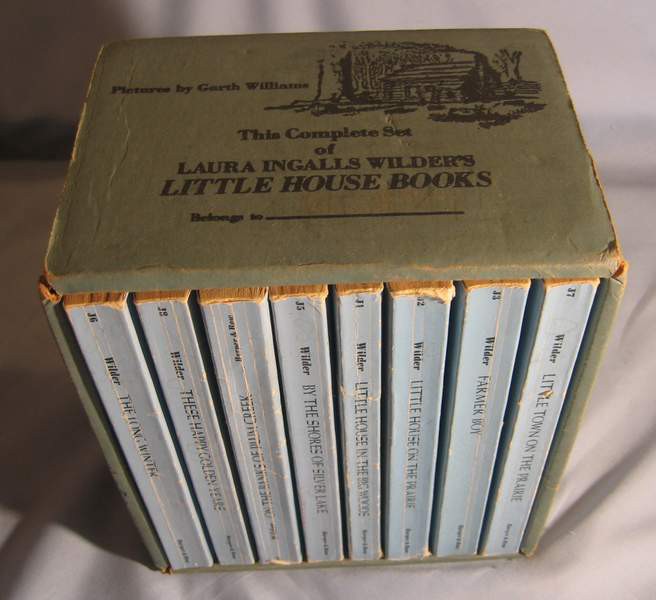
I don’t remember the time before I could read. Reading has always been an integral part of who I am, how I define myself, and how I structure my days. When work or life interferes to the point that I don’t get hours of reading squeezed in every week, I get antsy, and feel depressed and confused. It’s how I recharge my batteries and refresh myself.
And then I had a baby. Given an hour alone these days, it turns out, I’d much rather lay on my bed or stare at a wall, just being, than pick up a book.
In the early days of Zelda-life, I hadn’t realized that yet, and I felt frantic to read anything. We spent twenty-four hours a day together, and she was mostly just laying around, swaddled up in some container — a basket, a bassinet, her crib. It didn’t, at first, feel natural to me to have a one-sided conversation with my daughter. That passed very quickly, but before then, I filled our time together with reading. Sometimes I read the paper, sometimes The New Yorker (though sadly, she didn’t seem to enjoy it). Then I started buying her books I had cherished as a child, and we read them together.
The third book I read to Zelda was Alice’s Adventures in Wonderland (I’ll get to the first two in a second). Then The Wizard of Oz. Then The Little Prince, The Canterbury Tales (boy did she love them!), Me & Fat Glenda, and then Island of the Blue Dolphins. Then we chomped through The Phantom Tollbooth, and The Call of the Wild. Then we branched out from children’s literature and read My Struggle: Book One. Just kidding, I wouldn’t do that to her. That one I read alone.
Alone. Reading is largely a solitary activity, but reading aloud to someone is very different. During a series of long car trips years ago I read my favorite book — Jane Eyre — aloud to my husband. It took hours and hours, and I remember noticing how different this book, which I’ve read probably a dozen times, seemed when reading it together with someone. So Zelda has changed reading into a social activity, one which I really cherished in the first six months, before she could move around, when she was patient and happy just to listen to the sound of my voice.
But reading a book aloud to a baby, even one who doesn’t understand a word of what you’re saying, certainly changes your perception of the book. The first two books I read to Zelda were childhood favorites: Laura Ingalls Wilder’s Little House in the Big Woods and Little House on the Prairie. When I was eight or nine, I inhaled these books, compelled to begin reading them simply because the author and I shared a first name. I checked them out of the library one-by-one, slowly becoming obsessed with the idea of a pioneering lifestyle, so foreign and unknown to me. Then I asked for, and received, a boxed set of the books of my own.
But I hadn’t read the books since I was in middle school when I started to read them to Zelda, and though my memory of them was really quite solid — a testament to the vibrancy of the writing — I looked at these books with new eyes, and I didn’t like what I saw. It started off with little things. Pa skins a deer, sets some bear traps, and makes a ball for Laura and her sisters from the bladder of a pig. “It doesn’t hurt him, Laura,” Pa tells a whopper of a lie about butchering a pig on page thirteen. Of course, the pioneer life was all about these harsh realities, and I’m sure it’s at least partly what drew me to the books as a child. We don’t read to see an exact reflection of our own lives, or lives as we think they should be, after all.
But then Pa sings a song on page ninety-nine. Here are its lyrics (imagine that Pa is also fiddling):
There was an old darkey
And his name was Uncle Ned,
And he died long ago, long ago.
There was no wool on the top of his head,
In the place where the wool ought to grow.
There is a second verse but the first is enough, right? Imagine me reading these lyrics aloud to my daughter in her crib, just two weeks old. I didn’t. I started, then saw what the words said, and skipped right over the whole song. I imagined her, eight or nine years old, reading the words. Would she even know what it meant? Would she need an explanation? Would she ask me about it? “Oh you know, they were preeeettty racist back then, so sometimes people called black people ‘darkeys’ but not anymore. Great book though, right?” We kept going, even though at this point the varnish had started to wear thin on my childhood memories.
Nothing prepared me for Little House on the Prairie, formerly my favorite book of the series, which details the Ingalls family’s move from Wisconsin to Kansas in 1869, which at the time was still Indian Territory. This book is brimming with casual racism about Native Americans. They are described as “savages” and “wild,” and both Ma and the family dog dislike them openly. “Why don’t you like Indians, Ma?” Laura asks on page forty-six. “I just don’t like them; and don’t lick your fingers, Laura,” Ma said.
The Ingalls family are Manifest Destiny personified. The Osage Indians they encounter are a brooding pack of inconvenience, and just one Native American gets the role of the “noble savage” — a chief who supports the settlers against his own people to keep peace. Pa implies the worst about them (on page one hundred and forty-six) when he tells Laura and her sister that if given the opportunity, the Indians would certainly off the family pooch, Jack, but “that’s not all” he says. “You girls remember this: You do as you’re told, no matter what happens.”
I didn’t remember any of this from my childhood reading. I probably glossed right on over it in favor of the juicy details of skinning a rabbit or how Pa builds the cabin. The good stuff.
Zelda and I finished the book, but we decided (well, I did) not to read any further installments. These books are a fascinating and incredibly flawed version of a series of events which actually occurred, remembered through the eyes of a small child, and written in the nineteen thirties. As an adult, I can make sense of what I’m reading. I have context. I know history. And the events as described make me terrifically sad. I don’t think that a child of eight or nine can make sense of these books without a lot of context, a lot of explanation, and honestly, I’m just not sure they’re worth it. I’m not sure that their literary value is so high that I can overlook what I see as grave and deeply integral flaws. I think that they are outdated and old, and sometimes things just need to have an expiration date; they’re like curdled milk to me. I’ve thrown them into the garbage with the Velveteen Rabbit, which I have decided not to read to Zelda either, because the name Skin Horse is creepy and why bother worrying her about When Toys Become Real? Reality is tough enough without thinking about that. I put them into the garbage with the many other books which reflect a largely white, very Christian ideal conception of the world, because that conception is both innately flawed and also outdated.
That’s not to say that I think certain books should be censored or kept out of schools, or that they shouldn’t be read. (I don’t.) That’s also not to say that I think she is or will be “too young” to read them and understand. If I have learned anything in parenting it’s that babies and children pick up on things much faster than adults, and that she is capable of understanding so much, so easily. But parenting is all about making small judgements. When Zelda is seven or eight and can read, she will be allowed to read anything her heart desires. If she wants to read Laura Ingalls Wilder, I’ll explain to her how racist they are, and how flawed their vision of the world is, was, and always will be. Until then, we’re going to try to read something better. Like A Wizard of Earthsea.
THE PARENT RAP is an endearing new column about the fucked up and cruel world of parenting.
Laura June is a writer and a very cool mom. She is also the author of “The Vampire Diaries.”
Pushcart New York
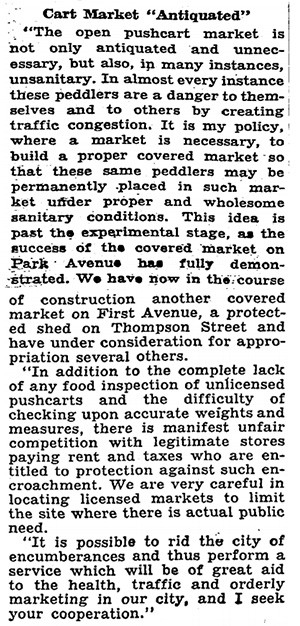
In a 1938 New York Times story, then-mayor Fiorello LaGuardia laid out the case against pushcarts. The street vendors, which were not as diverse as they were in pre-car New York but which still sold a wide variety of goods, including food, were an unlicensed liability to the city and its residents. They were a threat to “traffic, health and sanitation.” He said they were a holdout from a bygone era; he didn’t quite say, but meant, that they were evocative of tenements and rag sellers and How the Other Half Lives.
The plan for the Lower East Side was to replicate the city’s recent success with indoor markets. These places got vendors out of the way, and created, for residents, a sort of urban indoor mall. Normalizing these indoor markets would limit and possibly stigmatize outdoor vendors, or at least make them easier to police. The article describes a plan that eventually came to fruition as the Essex Street Market: “The department is also developing plans for placing the street peddlers in Orchard and Rivington streets in city-owned property on Essex Street, between Broome and Houston Streets.” You can see the city’s renderings for the buildings here. They’re not far from what was actually built, and remains today.
Demolition of a currently vacant building at “Site 2” is set to begin this month. Here, you can see a set of renderings for the building that will replace it, or at least part of it: a 26-story tower anchored by a movie theater.

The greater development, called Essex Crossing, will encompass existing buildings and nearby lots that have sat empty, used as parking lots, for decades. When it was announced, the deputy mayor described it like this: “This project is the pinnacle of urban development in 2013. It has all the hallmarks of a Bloomberg administration project: transforming an underutilized asset into a place that serves the diverse needs of the community.” Essex Market will move across the street to a larger, newer venue, where vendors have been promised stable rents, but where they will be joined by a supermarket. Right now, Essex Market contains a strange mixture of groceries, pre-prepared foods, expensive new indulgences and rare bargains. It’s a delicate ecosystem. It can be moved, but maybe not preserved.
Over the last ten years, the city, with the help of large developers, has been trying to solve the problem of street vendors once again. Instead of meeting the needs of an urban underclass, either through labor or goods, new vendors mirror the desires of a specific urban overclass. They are slick trucks, not carts. They serve lobster and ramen burgers; recently, Amazon rented a food truck to sell Kindles. This time around the city’s concern is less about traffic and filth and oversight than it is about convenience — the “problem,” today, is that the street vendor market opportunity is not being fully exploited. In 1940, a cluster of street venues was a scourge, and any nostalgia for pushcarts was misplaced:
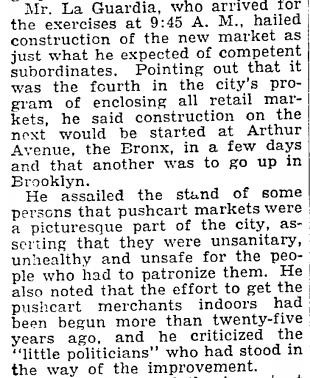
If you throw a dozen vendors together today, you have a rally. Get a few dozen, and you have a New York-inspired food theme park, conveniently located just over the Williamsburg Bridge.
This post has been corrected: The building that is set for demolition this month is currently vacant.
American Dream Expensive
Although it has been a little more than a month since the third quarter ended, I thought I’d show that the average sales price of the five boroughs in aggregate broke the $1 million threshold for the first time, to a record $1,040,516.
Home ownership is for suckers anyway. Except when it’s not, like right now? Oh. Well.
